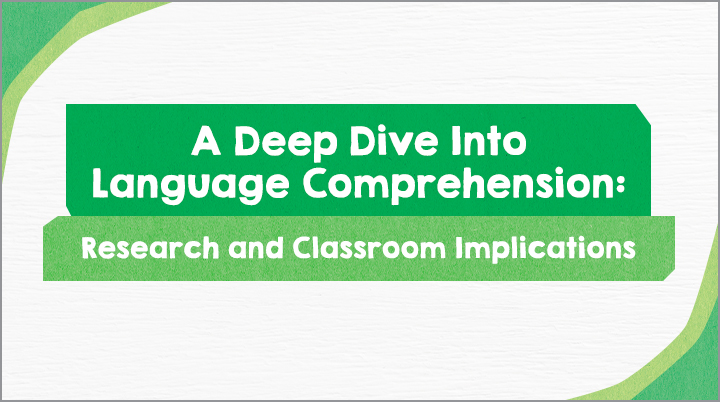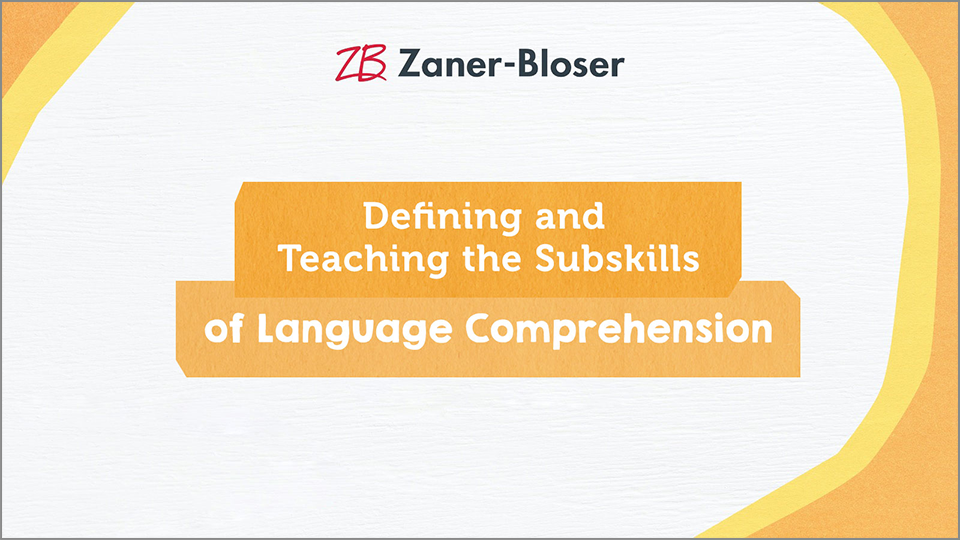On-Demand Reading Webinars
Learn about research and methods for teaching reading in Zaner-Bloser’s on-demand webinars for elementary teachers and administrators.

Instructional Leadership that Advances Literacy for All
Strong, intentional leadership plays a central role in building and sustaining high-performing schools. Join us as Angela Hanlin guides participants to discover the core principles of effective school leadership with a special focus on early literacy instruction. Hanlin covers what research tells us about leadership and reading instruction and connects this to her own journey supporting teachers, guiding instructional practices, and fostering a culture of continuous improvement.
Presented by Angela Hanlin
Register to Watch

A Deep Dive Into Language Comprehension: Research and Classroom Implications
Join us as Dr. Molly Ness identifies the importance of Scarborough's Reading Rope for reading education, examines the strands of the rope, and offers strategies and techniques that support their effective implementation in primary classrooms. Dr. Ness explicitly explores each strand of the language comprehension portion of the rope—background knowledge, vocabulary knowledge, language structures, verbal reasoning, and literacy knowledge. Earn CE credit.
Presented by Dr. Molly Ness and Angela Cammarata, M.Ed.
Register to Watch

Building Reading Fluency: The Power of Practice in K–2 Classrooms
Several researchers suggest that lack of practice may inhibit reading comprehension by preventing young
students from acquiring reading fluency and by limiting the amount of time struggling readers spend
reading text. This webinar addresses misconceptions and positions practice within classroom reading
instruction. Earn CE credit.
Presented by Dr. Stephanie Stollar and Angela Cammarata, M.Ed.
Register to Watch

Foundational Reading Skills in K–2: Bridging Research and Practice
Thanks to a large body of research collectively known as the science of reading, we know that
intentionally building foundational skills is critical to success at the K–2 level. This webinar connects
the research with practical ways to bring foundational skills instruction to life in the classroom and
explores what science tells us about how to best teach primary students to develop phonological and
phonemic awareness, phonics skills, and reading fluency. Earn CE credit.
Presented by Stacey Leitzel, Tina Falbo, and Suzanne Ludwig
Register to Watch

The Pivots We Need in Reading Instruction
This moment in education requires major shifts in our mindset and culture. We must examine every
assumption. Educators, families, and other stakeholders must work together to ensure they are putting
students in the best position to be successful readers.
Presented by Kareem Weaver
Register to Watch

Assessment for Learning: The Science of Screening
Early intervention for reading difficulties is critical for students’ future success. In this two-part
webinar, we explore the “what” and “why” of using reading assessments for learning and hear real-world
lessons from the field.
Presented by Angela Cammarata, M.Ed., and Angie Hanlin
Register to Watch

Literacy, Equity & Representation in Texts for Children
In this webinar, author and educator JaNay Brown-Wood, PhD, explores the connections between equity,
literacy rates across the U.S., development of literacy skills, and the importance of diversity and
representation in books and other texts for children.
Presented by JaNay Brown-Wood, PhD
Register to Watch

Understanding and Applying the Science of Reading
This five-part webinar series explores how to effectively and joyfully teach the "Big Five" components of
reading: phonemic awareness, phonics, fluency, vocabulary, and comprehension.
Registering gives you access to all five parts of this series.
Presented by Angela Cammarata, M.Ed.
Register to Watch

Defining and Teaching the Subskills of Language Comprehension
In this webinar, we take a closer look at the essential subskills of the language comprehension side of
the Simple View of Reading—background knowledge, vocabulary knowledge, language structures, verbal
reasoning, and literacy knowledge.
Presented by Angela Cammarata, M.Ed.
Register to Watch

Foundational Reading Skills: Now More Than Ever
Building a strong foundation for today’s primary students is more important than ever. Explore how best to
teach K–2 students to develop—and recover—phonological and phonemic awareness, phonics, and fluency skills
and get a preview of The Superkids Foundational Skills Kit.
Presented by Stacey Leitzel
Register to Watch

Blossoming With Phonological and Phonemic Awareness
Phonological and phonemic awareness are necessary precursor skills for all students as they learn how to
read. These skills can be developed and taught with a variety of fun and quick activities. Learn about the
research, including how phonological and phonemic awareness skills should be taught in grades K–2, and get
a preview of The Superkids Phonemic Awareness curriculum.
Presented by Stacey Leitzel
Register to Watch

THE
SCIENCE OF READING SERIES
Why Evidence Should Guide Instruction
This is part one of our three-part webinar series examining the “why,” “what,” and “how” of the science
of reading. In part one, we cover the convergence of evidence on the process of reading and effective
reading instruction.
Registering gives you access to all three parts of this series.
Presented by Laura Stewart
Register to Watch

THE
SCIENCE OF READING SERIES
What Works in Early Reading Instruction
This is part two of our three-part webinar series examining the “why,” “what,” and “how” of the science
of reading. In part two, we cover the foundational skills of reading and what to expect in classroom
instruction.
Registering gives you access to all three parts of this series.
Presented by Laura Stewart
Register to Watch

THE
SCIENCE OF READING SERIES
How to Put It All Together (Instruction Counts!)
This is part three of our three-part webinar series examining the “why,” “what,” and “how” of the
science of reading. In part three, we explore the evidence-based characteristics of effective reading
instruction with examples.
Registering gives you access to all three parts of this series.
Presented by Laura Stewart
Register to Watch